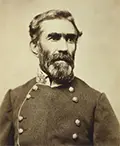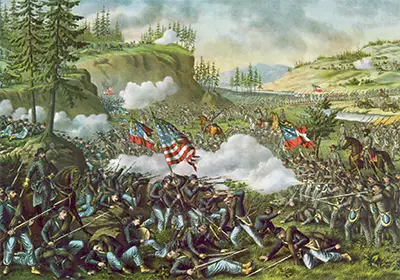Confederate General Braxton Bragg
Braxton Bragg was a Confederate general during the American Civil War. He is most well-known for his victory at the Battle of Chickamauga in 1863. He was born on March 22, 1817, in Warrenton, N.C. His father had found success as a carpenter but wanted his son to join the Army. Braxton enrolled at the U.S. Military Academy when he was 16. 
Bragg graduated from West Point in 1837 and fought in the Second Seminole War in Florida and in the Mexican-American War, playing a crucial role in the victory at Buena Vista and earning widespread acclaim. He resigned his commission in 1856 and went home. He had married Eliza Brooks Ellis in 1849, and they had bought a sugar plantation in Thibodaux, La. When the Civil War began, Bragg organized a Louisiana armed force and took control of the federal arsenal at Baton Rouge. He was appointed a brigadier general and the commander of the Gulf Coast defense force. Promoted to major general in September 1861, he led men at Battle of Shiloh in April 1862. He won promotion to general and then took over command of the Army of Mississippi from Gen. P.G.T. Beauregard. Bragg led his troops into battle in 1862 in Kentucky, in the Battle of Perryville, a Confederate defeat. 
He is most well-known for his battles with Union Maj. Gen. William S. Rosencrans. Their first encounter was at Stones River, Tenn., at the end of 1862. Rosencrans gained the upper hand there but found his fortunes reversed at Chickamauga, in September 1863. It was a resounding triumph for the Confederacy, resulting in casualties of about 30,000 for the Union. Bragg followed up his victory there with a siege of Union troops in Chattanooga. Only a timely arrival of troops under Ulysses S. Grant saved the city. Bragg left Tennessee and headed to Georgia, resigning his commission as head of what by that time had been renamed the Army of Tennessee. Bragg continued in the military. He served as an advisor to Confederate President Jefferson Davis, improving the Confederate conscription and prisoner of war systems. He took command of the Wilmington, N.C., coastal defenses and then later served as a corps commander at the Battle of Bentonville in the last year of the war. He was capture not long before the end of the war. Because Union troops had seized his home during the war, he and his wife relocated to Alabama. He had a handful of different jobs after the war, including serving as superintendent of the New Orleans Waterworks, selling life insurance, and working as a railroad inspector; for this last assignment, he moved to Texas in 1874. He died on Sept. 27, 1876, in Galveston, Texas. he was 59. |
|
Social Studies for Kids
copyright 2002–2024
David White




